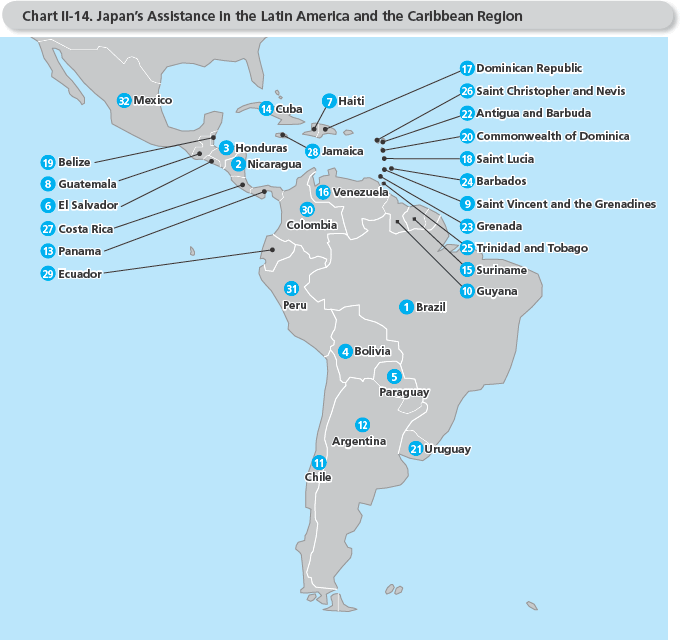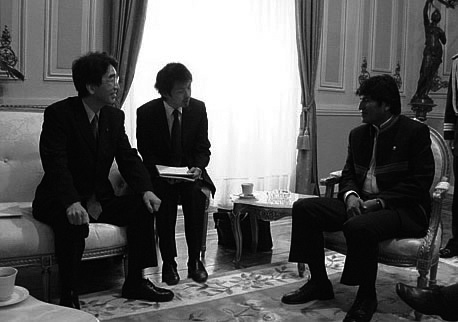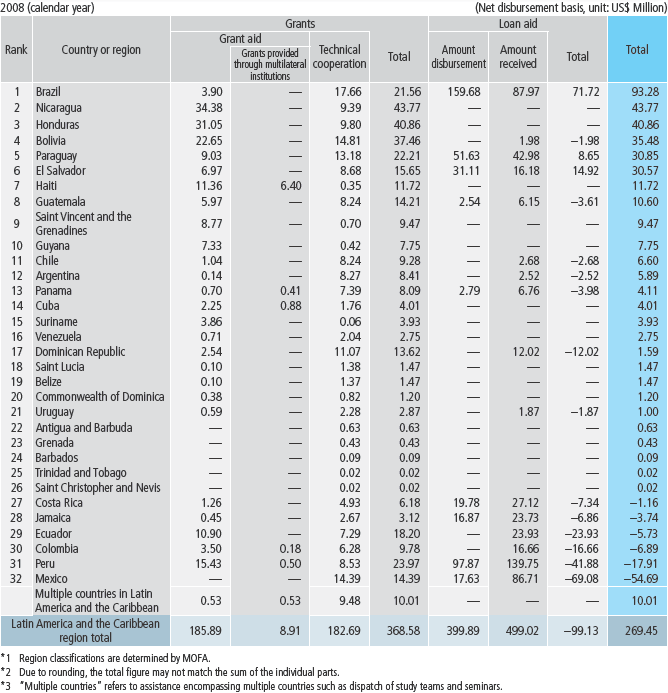Japan's Official Development Assistance White Paper 2009
6. Latin America and the Caribbean
•Approximately US$269.45 million (approximately US$768.47 million)
•Approximately 3.9% of total bilateral aid (approximately 5.2%)
Latin America and the Caribbean boast a population of 560 million with a large market of US$3.54 trillion in regional gross production. The region is also increasing its presence within the international community through the establishment of democracy and continuing stable growth, in addition to its role as a provider of minerals and energy resources, such as steel, copper, silver, rare metals, crude oil, natural gas, biofuel, as well as food resources. The average income level of nations in the region is comparatively high compared to other ODA recipient countries; however, a characteristic of this region is the marked domestic disparity between the rich and poor classes and continued existence of poverty. Moreover, efforts to address climate change have also become important as the region has an abundance of nature, including the Amazon Rainforest.
<Japan's Efforts>
Japan and the nations of Latin America have traditionally created a friendly relationship, and through ODA, Japan provides support for challenges such as creating a foundation for sustainable growth in these countries, assistance for reducing poverty and redressing disparity, the consolidation of peace, and South-South Cooperation. Japan's assistance for sustainable growth in the region consists of activities such as infrastructure development and cultivating small- to medium-sized enterprises. In addition, Japan also provides assistance in such social development sectors as health and medical care, education, and community development in order to tackle poverty and income disparity, which are historical issues of the region. Japan also provides assistance in the consolidation of peace in areas such as Haiti, the poorest country in the Western Hemisphere, and Colombia, which faces the issue of maintaining peace with antigovernment forces.
As for common development issues throughout the Latin America and the Caribbean region, Japan creates region-wide projects while working together with regional communities such as the Sistema de la Integración Centroamericana (SICA), Mercado Común del Sur (MERCOSUR), and the Caribbean Community (CARICOM) in order to implement more effective and efficient assistance policies. Many years of continued economic cooperation disbursements by Japan have also allowed it to partner with Chile, Brazil, Argentina, and Mexico—which have all reached a level where they can provide assistance to third-countries—to conduct such efforts as third-country training and dispatching third-country experts in Latin American and African nations.
As well as deforestation and degradation in the Amazon, other environmental problems are worsening in Latin America and the Caribbean, including the growing hole in the ozone layer, declining glaciers in the Andes caused by climate change, and frequent natural disasters such as hurricanes. Japan provides assistance in such areas as natural environment conservation and disaster prevention in order to restrain these problems and mitigate their impacts.
Japan works to spread the Japanese standard of digital broadcasting (ISDB-T (Note 44)) in cooperation with the Japanese private sector. Particularly in Latin America, this standard has been spreading as Brazil adopted the standard in 2006, and then, as the result of the collaboration with Brazil on this matter, Peru, Argentina, Chile, and Venezuela made the decision to introduce this standard in 2009. The promotion of digital broadcasting helps to improve regional broadcasting media, and the diffusion of Japanese standards can help Japanese enterprises enter overseas markets. Japan supports these countries through technology transfer and human resource development.
Notes:
(44) Integrated Services Digital Broadcasting-Terrestrial
The Project for Strengthening Nursing Education and In-service training in El Salvador, Guatemala, Honduras, Nicaragua and the Dominican Republic
In Central America and the Caribbean, improving the quality of nurses is a major challenge in aim to reduce the region's constantly high infant and maternal mortality rates. Japan has established a nurse training system and has been providing assistance since August 2007 for a planned period of three years, undertaking efforts to improve the quality of nurses. Senior nursing teachers from Guatemala, Honduras, and the Dominican Republic that received training in El Salvador, which is the base for the project, have returned to there own countries and are providing training. By March 2009, a total of nine training sessions were conducted in these countries, allowing for training 257 senior nurse teachers.


Parliamentary Vice-Minister for Foreign Affairs Shuji Kira meeting with President Evo Morales of Bolivia

